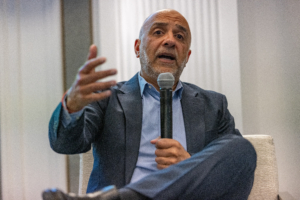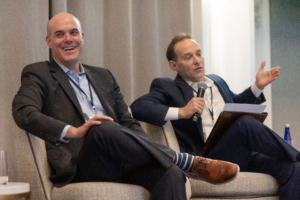Every year, we have the pleasure of bringing together our strategic limited partners, executive advisors, and portfolio company CEOs for an event filled with networking, insightful discussions, and, of course, a lot of fun. While we spend significant time with these groups throughout the year, the chance to convene everyone in an intimate setting truly stands out, sparking extremely valuable in-depth discussions.
The 2024 LRVHealth Annual Meeting centered on the pressing issues and challenges healthcare leaders are facing around innovation and transformation. Our agenda highlighted key themes in healthcare that have been a major focus for our team at LRVHealth — specialty pharmacy, Gen AI, and specialty care transformation.
We want to extend a huge thank-you to our speakers for bringing bold opinions and intriguing ideas, which pushed everyone in the room to consider diverse perspectives. We also want to thank all attendees for making this year’s Annual Meeting a success!
We’ve compiled some of the key takeaways and provocative viewpoints shared during some of the panels.

Specialty Pharmacy: Therapeutics are increasingly important in healthcare, but the system struggles with access vs. cost
We brought together entrepreneurs innovating in pharmacy along with incumbent players to discuss the challenges and growth drivers of specialty pharmacy. Josh Flum, Managing Partner at LRVHealth, moderated this panel and was joined by Troyen Brennan, MD, CVS Health‘s former Chief Medical Officer and Adjunct Professor at the Harvard T.H. Chan School of Public Health; Josh Sternberg, Partner at McKinsey & Company; Julia Regan, CEO and Co-Founder of RxLightning; and Ogi Kavazovic, CEO and Co-Founder of House Rx.

Key takeaways from the specialty pharmacy panel included:
- Stakeholders across the value chain — from pharma and payers to providers and patients — are at odds over how to balance appropriate access to therapies with managing affordability, and all the stakeholders have their own vested interest. We looked at intriguing coverage examples from payer, provider, and manufacturer perspectives to understand their varying points of view.
- Panelists agreed that patients are the ones often caught in the middle and who suffer the most. Significant challenges persist in getting patients on medication, even after the drug has been prescribed and approved. Innovators such as RxLightning are recognizing these frictions and developing solutions to address access challenges.
- Traditional models of centralized specialty pharmacy distribution are increasingly being disrupted in favor of new models (e.g., House Rx, health system pharmacies) that are much closer to and convenient for patients and prescribers.

Generative AI: The hype behind Gen AI is warranted, but give it more time to transform healthcare
While the potential for Gen AI is enormous, it’s important for healthcare decision-makers to understand where this emerging technology will make an impact now and in the future.
We gathered five of the foremost leaders in the space to discuss the hype vs. reality when it comes to Gen AI: Peter Durlach, CVP & Chief Strategy Officer of Microsoft Health & Life Sciences; Seth Hain, SVP of R&D at Epic; John Halamka, MD, President of the Mayo Clinic Platform; Lisa Stump, SVP, Chief Information and Digital Transformation Officer, Yale New Haven Health and Yale Medicine; and Micky Tripathi, PhD, National Coordinator for Health Information Technology at the U.S. Department of Health and Human Services.

Keith Figlioli, Managing Partner of LRVHealth, moderated this session and some of the key highlights from the panel included:
- AI adoption will be “slower than we want and faster than we feared.”
- Gen AI presents a transformative opportunity, allowing nearly programmable access to creativity. However, the data and technology infrastructure necessary to unleash this potential remains underdeveloped.
- Organizations leveraging Gen AI will likely surpass those that don’t. Evaluating its application against a value-to-risk maturity matrix is essential, and this assessment may differ by organization. Clinical applications will typically have higher value but also higher risk as compared to non-clinical applications.
- AI has the power to unlock organizational potential and tackle systemic issues such as margin pressures and burnout. However, healthcare organizations need to make sure they have the right governance structure in place as they deploy AI applications. This includes educating the board and leadership team on this technology to ensure they are equipped to evaluate the trade-offs between the risks versus rewards.

Specialty Care: Incumbents and innovators discuss the challenges and opportunities for true transformation
When we think about the transformations in care delivery that have taken place over the last several years, much of the focus has been on at-risk primary care. However, there are limits to the clinical and financial results that can be achieved in primary-care-only models when the majority of healthcare spend continues to sit in specialty care. At the same time, health systems and independent specialists are redesigning their clinical enterprises in response to tightening market pressures by leveraging many of the learnings that fueled the explosion of innovation in primary care in the first place.

We brought together a panel of leaders across the specialty care ecosystem to explore the intricacies of specialty care transformation and what the future holds: Denise Basow, MD, EVP and Chief Digital Officer at Ochsner Health; Dan Nardi, CEO of Reimagine Care; Scott Belsky, SVP of Population Health at Oak Street Health; Dr. Stephen Schleicher, Chief Medical Officer at Tennessee Oncology; and Neil Hattangadi, MD, CEO of Cortica.
Moderated by Ellen Herlacher, Partner at LRVHealth, the panelists discussed the following topics:
- Accessing specialty care today is difficult due to a shortage of specialists, and is made worse by uneven geographic distribution and increasing sub-specialization.
- As risk adjustment becomes a less powerful tool in achieving medical loss ratio (MLR) targets, risk-bearing entities are more heavily scrutinizing specialty spend, which comprises 60% of healthcare costs today. There are a variety of perspectives on who “owns” the management of specialty care. Some entities are expanding the walls of primary care as far as possible to absorb more specialty care. Others prefer to delegate any specialty spend that they cannot manage. For risk-bearing entities, the decision to delegate or not has implications for the scope of the practice, as well as attribution of economics and outcomes.
- For certain specialties where the costs of therapies are extremely high (e.g., oncology), the potential to lower the unit cost of treatment may be somewhat limited; however, at a population level, there is still an opportunity to contain costs and improve outcomes by expanding access to specialty care so that people can have timely access to diagnostics and treatment.

Innovating in healthcare? We want to chat!
If you are an entrepreneur innovating in one of these areas of healthcare, please reach out to us — specialty pharmacy ([email protected]), data and AI ([email protected]), or care delivery ([email protected])!